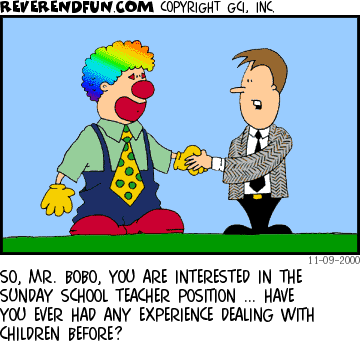
Welcome to a continuing series of tips on working with large groups of children. I hope that you will find these tips useful and be able to implement them in your dealings with large groups of kids. If you do, please leave a comment and let us know. For a complete list of posts in this series, please see the index page. So, without further introduction, here is today’s installment.
There is no denying it – we work in children’s ministry. We work with kids, and because of that, many people are of the opinion that we must “dumb down” our message in order to reach our audience. Nothing could be further from the truth! Indeed, the idea itself is offensive to the gospel of Christ. No doubt, elements of God and his Word are so mysterious and so foreign to us as finite human beings that we will never understand them this side of heaven. Nonetheless, the simplicity of the gospel is oftentimes easier grasped by children than by those jaded by years of life and hardness of heart.
As those who work in Children’s Ministry, we are in a unique position to know what kids are really capable of. Oftentimes, that which they are capable of will exceed our wildest expectations. In Children’s Ministry, and all other teaching of children, we must not be content to teach to the lowest common denominator. A child who is never challenged will never have the opportunity to exceed. If we were teaching mathematics or foreign language or any number of other topics, the consequences of underestimating our audience would not be as grave, but we are called to teach them the things of God. We cannot afford to deprive them of God’s knowledge solely because we deem it incomprehensible for someone their age.
So, what does this look like in Children’s Ministry? How do we consistently and effectivel challenge the kids in our ministry? Well, we start by not shirking away from those things that we deem too hard for them to understand. Challenge them with theology. Teach them doctrine. Get their little heads thinking about things like the trinity, the hypostatic union of the humanity and divinity of Jesus, and election vs. free will. Their heads might not process it the same way we would – though frankly I think they sometimes grasp these concepts much better than we do – but our job is to start them on the path of thinking and considering the things of God. Part of the challenge, part of the fun, and part of our calling to teach kids about God is finding a way to convey complex information and concepts in a way that they can understand. If we leave our kids scratching their heads because they do not understand something we have taught, it is much more likely the fault of the teacher than the material being taught!
Return to the Tips for Large Group Teaching in Children’s Ministry index page.

